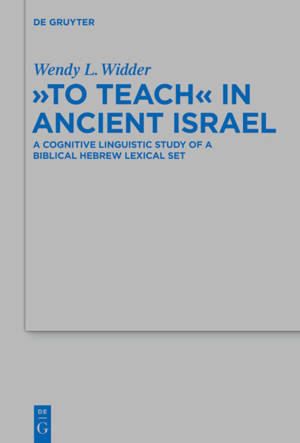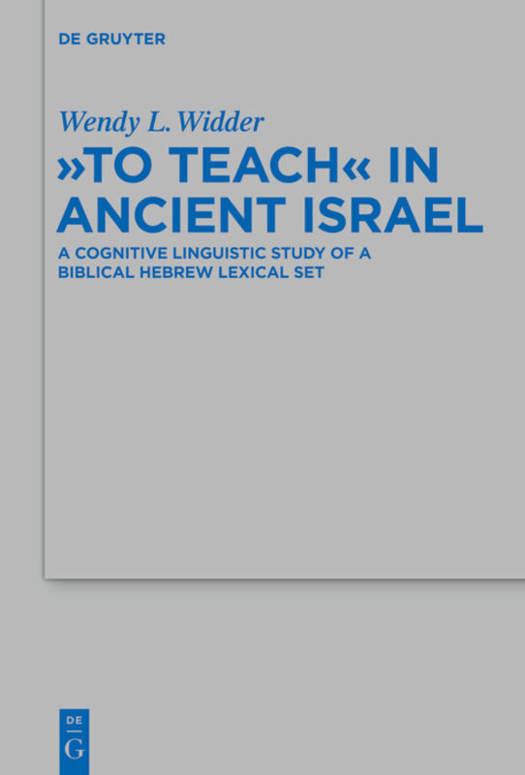
- Afhalen na 1 uur in een winkel met voorraad
- In januari gratis thuislevering in België
- Ruim aanbod met 7 miljoen producten
- Afhalen na 1 uur in een winkel met voorraad
- In januari gratis thuislevering in België
- Ruim aanbod met 7 miljoen producten
To Teach in Ancient Israel
A Cognitive Linguistic Study of a Biblical Hebrew Lexical Set
Wendy L WidderOmschrijving
This book employs cognitive linguistics to determine the foundational elements of the ancient Israelites' concept of teaching as reflected in the text of the Hebrew Bible and Ben Sira. It analyzes four prominent lexemes that comprise a lexical set referring to the act of teaching: ירה-H, למד-D, ידע-H, and יסר-D. The study concludes that, in its most basic form, the concept of teaching in ancient Israel was that a teacher creates the conditions in which learning can occur.
The methodology employed in this project is built on a premise of cognitive studies, namely, that because teaching is a universal human activity, there is a universal concept of teaching: one person A recognizes that another person B lacks knowledge, belief, skills, and the like (or has incomplete or distorted knowledge, etc.), and person A attempts to bring about a changed state of knowledge, belief, or skill in person B. This universal concept provides the starting place for understanding the concept of teaching that Biblical Hebrew reflects, and it also forms the conceptual base against which the individual lexemes are profiled.
The study incorporates a micro-level analysis and a macro-level analysis. At the micro-level, each lexeme is examined with respect to its linguistic forms (the linguistic analysis) and the contexts in which the lexeme occurs (the conceptual analysis). The linguistic analysis considers the clausal constructions of each instantiation and determines what transitivity, ditransitivity, or intransitivity contributes to the meaning. Collocations of the lexeme, including prepositional phrases, adverbial adjuncts, and parallel verbs, are evaluated for their contribution to meaning. The conceptual analysis of each lexeme identifies the meaning potential of each word, as well as what aspect of the meaning potential each instantiation activates. The study then determines the lexeme's prototypical meaning, which is profiled on the base of the universal concept of teaching. This step of profiling represents an important adaptation of the cognitive linguistics tool of profiling to meet the special requirements of working with ancient texts in that it profiles prototype meanings, not instantiations.
In the macro-analysis, the data of all four lexemes in the lexical set are synthesized. The relationships among the lexemes are assessed in order to identify the basic level lexeme and consider whether the lexemes form a folk taxonomy. Finally, the profiles of the four prototype meanings are collated and compared in order to describe the ancient Israelite concept of teaching.
The study finds that the basic level item of the lexical set is למד-D based on frequency of use and distribution. In its prototypical definition, למד-D means to intentionally put another person in a state in which s/he can acquire a skill or expertise through experience and practice. In contrast to this sustained kind of teaching, the prototypical meaning of ירה-H is situational in nature: a person of authority or expertise gives specific, situational instruction to someone who lacks knowledge about what to do. The lexemes יסר-D and ידע-H represent the most restricted and the most expansive lexemes, respectively: the prototypical meaning of יסר-D is to attempt to bring about changed behavior in another person through verbal or physical means, often to the point of causing pain; the prototypical meaning of ידע-H is that a person of authority causes another person to be in a state of knowing something from the divine realm or related to experiences with the divine realm. The study determines that while the four lexemes of the Biblical Hebrew lexical set "to teach" have significant semantic overlap, they cannot be construed in a folk taxonomy because the words are not related in a hierarchical way.
Specificaties
Betrokkenen
- Auteur(s):
- Uitgeverij:
Inhoud
- Aantal bladzijden:
- 256
- Taal:
- Engels
- Reeks:
- Reeksnummer:
- nr. 456
Eigenschappen
- Productcode (EAN):
- 9783110335491
- Verschijningsdatum:
- 20/01/2014
- Uitvoering:
- Hardcover
- Formaat:
- Genaaid
- Afmetingen:
- 160 mm x 234 mm
- Gewicht:
- 498 g

Alleen bij Standaard Boekhandel
Beoordelingen
We publiceren alleen reviews die voldoen aan de voorwaarden voor reviews. Bekijk onze voorwaarden voor reviews.









